Misai (Japanese drummer)
Interview by David Cirone
November 15, 2016
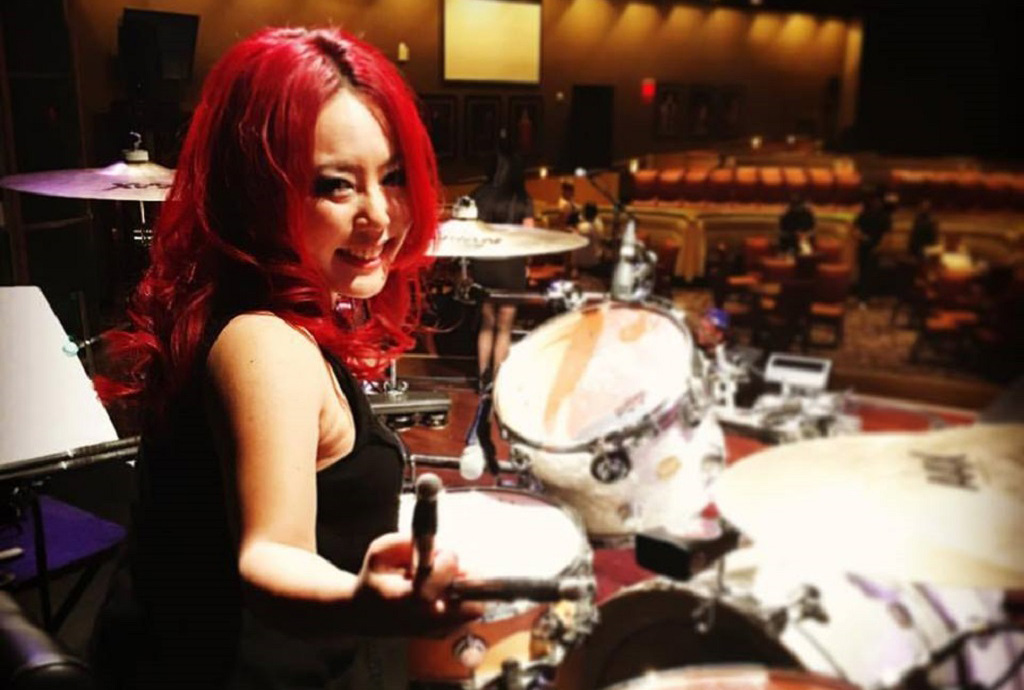
Fiery-haired, Las Vegas-based Japanese drummer Misai has been performing non-stop since her arrival in the States in 2009, working her way through the indie music scene in L.A. and making a name for herself in industry-respected bands like Alison Chains (the world’s only all-female tribute to Alice in Chains) and all-girl rock band Dollface, who keep up a steady schedule on Las Vegas stages all year round. If you’ve hit Fremont Street’s outdoor stage recently, chances are you’ve seen her playing her heart out (video) for tourists and partying locals who might not realize that they’re grooving to a girl whose communicating in a second-language: rock-n-roll.
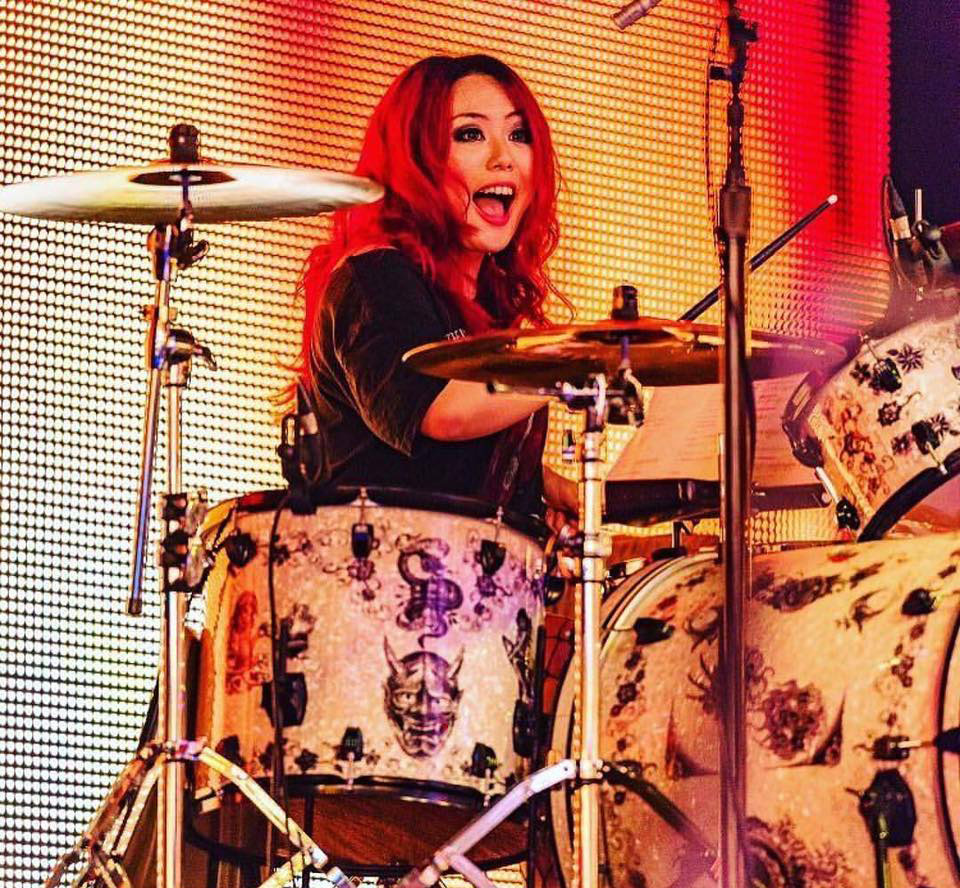
When did you start playing drums?
Misai: I started playing drums when I was 13 years old. I was bullied at school at the time, so I stopped going to school. I did a lot of reading on my own, just whatever caught my eye. When I was reading some music magazine, I saw an article about famous Japanese band, La’cryma Christi. It was a cool article, and it made me curious. I bought their CDs and decided to go see them at their concert.
You got hooked!
Misai: Yes! I couldn’t stop watching the drummer. It made me feel so great, I thought “I wanna try that!” One of the teachers from my school who went to the concert with me still had her son’s old drum set, and she saw how excited I was. She had a special class for students like me who had problems, and she brought the drum set to her classroom.
Was that normal, to have drums in a classroom?
Misai: No! It sort of got me in trouble, but in a good way. The vice principal always ran into the class and told me “Sorry Misai-chan! We are having a meeting, please be quiet.” But even then, it was a positive feeling. I was imagining being on the live stage like La’cryma Christi.
How did drums give you more confidence to deal with bullies and school?
Misai: It made such a difference. It honestly saved my life. I was so troubled and stressed, I thought about suicide a lot. Drums changed everything for me and gave me confidence.
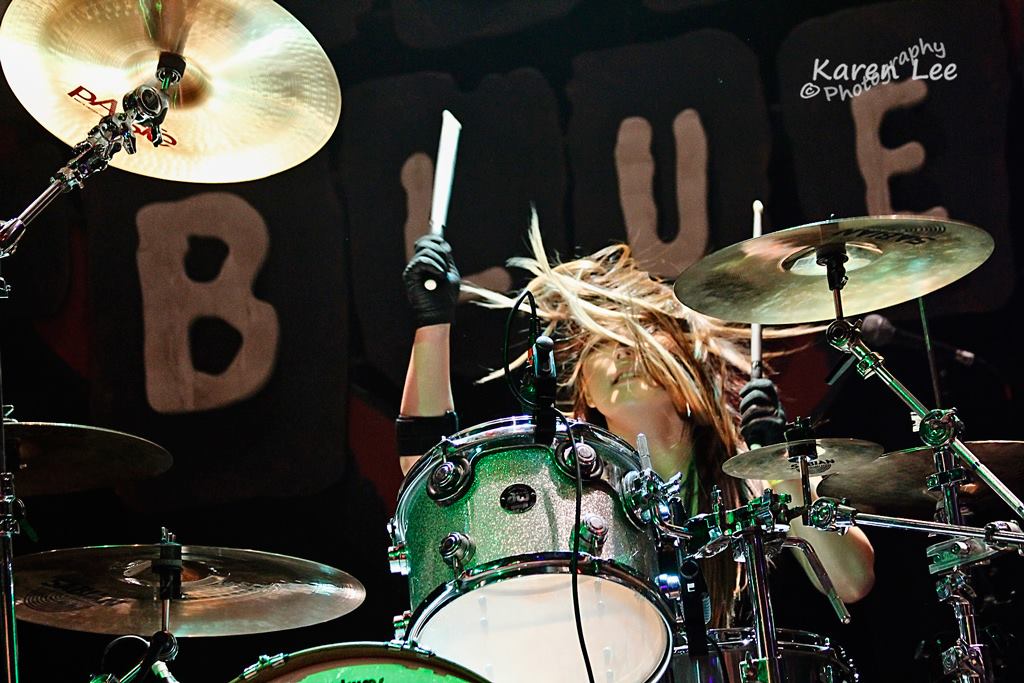
When did you start to think that this could be your career?
Misai: My teacher told me that I couldn’t go to public high school because my attendance wasn’t good enough, but by that time, I wasn’t thinking about normal school or a normal life. I found a music school in Osaka, not far from my hometown of Hyogo. The music school accepts students who just graduated from junior high school.
What did your parents say about you leaving home? Where they worried?
Misai: My parents supported me all the time, but I had to sign a contract with them, like “Go home by 7pm” or “Do all the housework by yourself.”
They made you work for it! That’s a good move by your parents.
Misai: I was 15 years old, but I was doing everything by myself.
How long were you at that school?
Misai: I was there three years, and I had to take music classes and regular high school classes at the same time. My schedule was crazy! Monday through Friday, morning to noon was for music lessons, then every day from noon to evening was for studying with my tutors at the music school to cover high school subjects. Saturday and Sunday we had academic classes, too.
Most of the drummers I know in Japan play for 2-3 bands simultaneously. You’d have less competition in Japan, so why did you want to play in America?
Misai: I couldn’t find people I really want to play with. Even though I started out paying attention to Japanese bands, I started to pay more attention to American rock bands, and I had this dream of playing with musicians from other parts of the world. It seemed very far away, that goal, but I thought “maybe I can do it.”
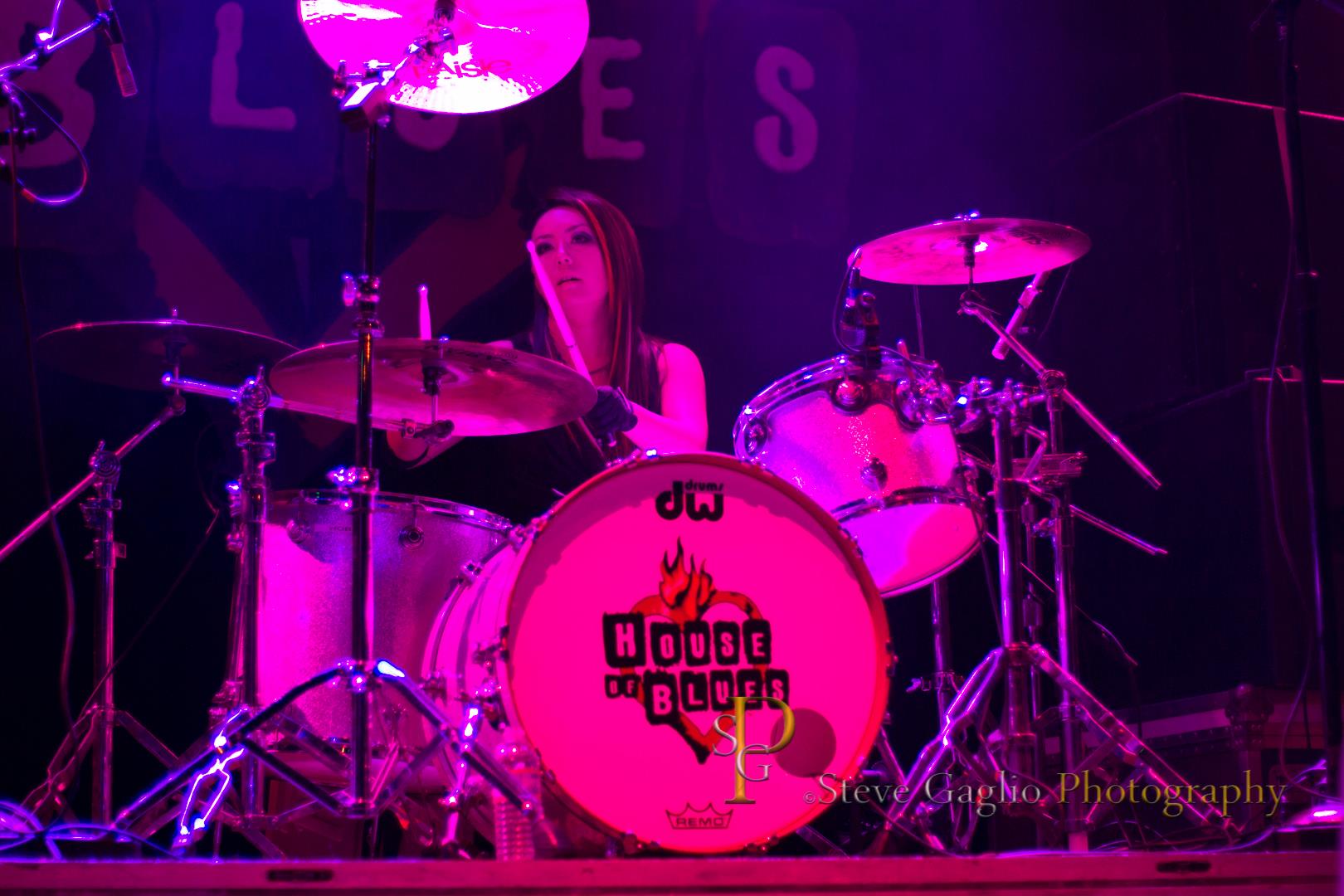
What type of songs did you want to play?
Misai: I liked Motley Crue. Alanis Morissette. Marilyn Manson, KORN, Pantera…
You’ve been playing in USA since 2009 — are you happy with your choice to come to America? Do you want to stay here forever?
Misai: I don’t want to stay in the U.S. forever… but maybe close that! I want to stay as long as there are good bands who need me as a drummer!
Was it hard to get American bands to accept you?
Misai: I’ve always gotten a good response to my drumming, but my English was sometimes so terrible when I first got here! It’s a miracle, because of music I could communicate!
How did you meet Allison Chains?
Misai: The guitar player was one of the members from my first band in the U.S. When I did my first audition in the U.S., the guitar player and the singer were there. Actually, the bass player from Dollface is the bass player from my first band in the U.S. too.
You made good connections fast.
Misai: Yes! I was lucky!
What do you think is your best achievement in the USA so far? What are you proud of?
Misai: Well, this isn’t necessarily a musical achievement by itself, but getting my artist visa is something I’m really proud of. It’s hard to make that happen, and it means that my hard work is being recognized by others. I don’t have to hold a student visa or something else that gets in the way. I can focus on music every day. And I’m lucky to stay busy as a musician. It’s something I never want to give up.
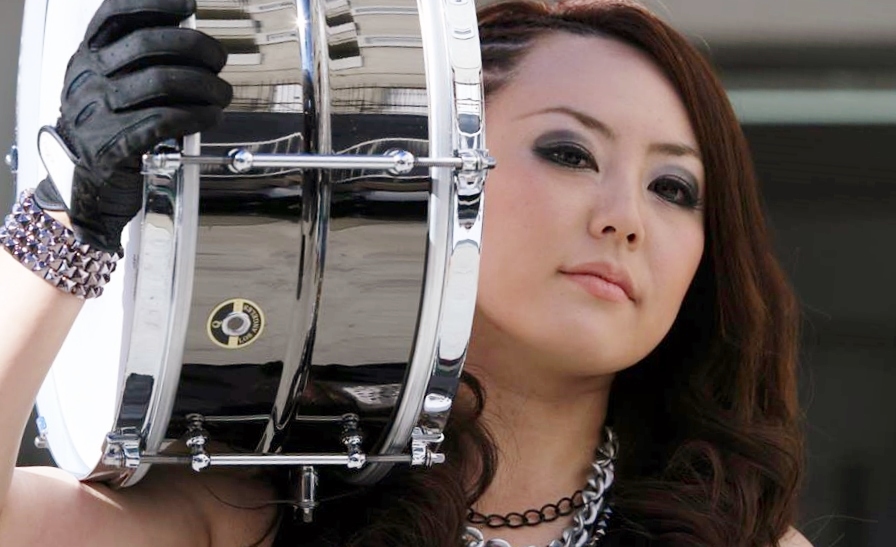
It’s a big challenge to come to a new country and make you way as a professional. What keeps you going?
Misai: I want to travel all over the U.S. and play drums. Music makes me happy and I see how it makes other people, too. I want to save people who are suffering from bullied or terrible things, like the drummer from La’cryma Christi saved my life. When we [Dollface] play on Fremont Street in Vegas, I see people who are visiting from all over America, all over the world. Kids are jumping, men and women are smiling. So I know I’m doing the right thing. I’m planning to go back to Japan and create a drum experience clinic for kids.
The connection with kids is important to you. You see yourself in them?
Misai: With Dollface, I got to perform at a Special Olympics event in Connecticut. It was like 10,000 people, and it was such great energy! At the opening ceremony, many kids came on the stage and danced and sang with us. Then the kids gave flowers to their favorite members. This was my first time someone gave me flowers on stage!
Your band did a performance for the Dream Ride project, too, right?
Misai: Right. It was for a good cause, so it was easy for us to get energized. The kids with disabilities respond so freely to the music, and drumming really reduces stress. I used to to do some drum experience clinics at a music & clothing store in Little Tokyo, but that shop closed down. I borrowed some electric drum kits from Roland and ask people who are going shopping if they are interested in trying drums, and almost everyone said “yes”! I’m hoping to do something like that again in the spring here in Las Vegas. My dream is to go back to Japan and do it there, too. I found out there are special schools for kids who stop going to school because of bullying, and those kids have the same hopeless thoughts I had. I want to try to help them as much as I can.
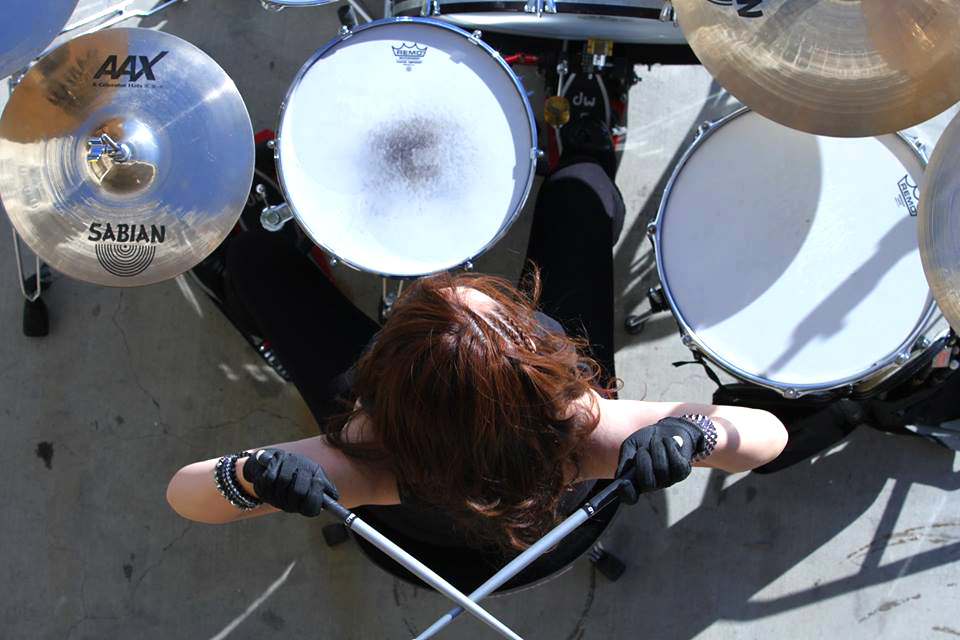
When you’re not playing and rehearsing, you’re busy networking. Tell me about some of the famous musicians you have met in America.
Misai: I met so many musicians at NAMM or at events. James Kottak came to our show after his Scorpions show in Vegas. He told me “You’re a great drummer!’ and I didn’t know who he was at the time. I just thought he was some rock star-looking guy. He was talking about his tours in Japan, and I was like ” wow, that’s cool.” I wish I knew he was James Kottak! When I met Vinnie Paul from Pantera/Hellyeah, I told him “I’m a drummer from Japan and I love your drumming! Thank you for the great music!” and he told me “Domo Arigato!” I never expected that Vinnie Paul would talk in Japanese! NAMM is also how I started getting professional endorsements, like with Ahead Drumsticks, Roland, and DW.
How busy is your music schedule? How many shows do you play each month?
Misai: My schedule always changes a lot, but from spring to summer this year, it was crazy. One month, I think it was February, we went from shwos in Sacramento, Planet Hollywood in Vegas, O’Shea’s in Vegas, L.A. rehearsals, shows in Ontario, back to Planet Hollywood, back to O’Shea’s… just in a couple of weeks.
How do you keep your energy?
Misai: Energy drinks! It’s hard to keep up sometimes, but it’s what I need to do for my career. I like Monster but I don’t want to drink it too much, so I try to buy small cans, like the size of Japanese can coffee.
Do you ever teach Japanese food and culture to your band members?
Misai: I try! Shirin the guitar player always stays with me when we have shows in Vegas, since she lives in L.A. I always cook Japanese food for her, and I teach her how to say some words in Japanese. I used to live in Osaka and okonomiyaki (Japanese veggie pancake) is from Osaka, so I know how to cook it really well.
You came here on your own, but there’s no real guide for making it as a Japanese artist here in the States. When other Japanese musicians talk to you about coming here, what do you tell them?
Misai: Definitely study English, because so many people don’t even try to listen to you if your English is not good, I learned that from experience, Accept the American culture, it’s just so different from our culture in Japan. Be ready to do things yourself when there’s a problem, and you’ll be able to handle anything. I thought I was strong when I got here, but had to get stronger. And that’s OK. It means I’m not giving up, and it means I can keep going after my dream.
Misai’s Official Facebook: https://www.facebook.com/misai.drums.official
